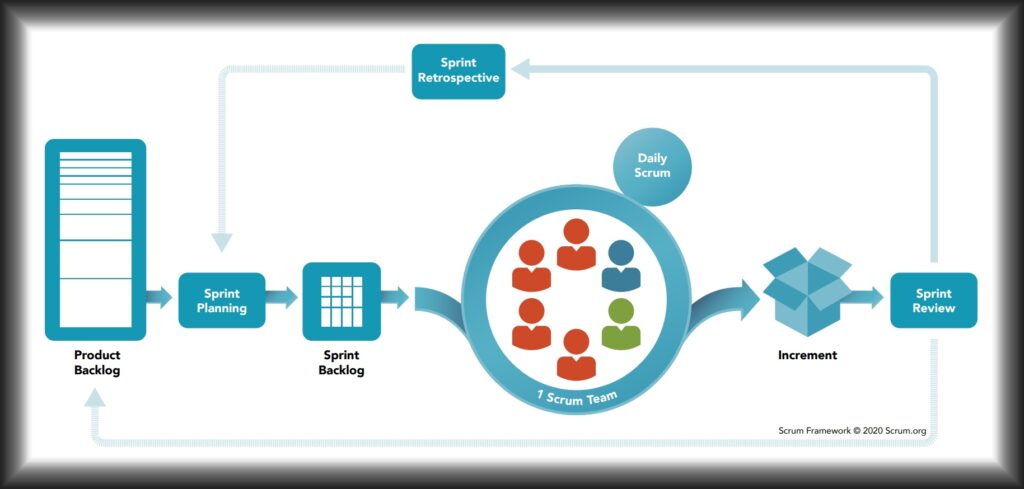Scrum Master
Scrum was originally developed for complex software development projects, but is now being used on almost any type of team-based product work. The framework is a simple yet powerful way to bring order to complexity through learning by providing opportunities for frequent feedback on both how we work and the thing we have been and will be working on.
The Fundamentals of Scrum are:
- Empirical process through evidence-based inspection and adaptation of how the work is done and what is being delivered
- Self-managed, empowered teams who are closest to the problems and the work to best make decisions
- Continuous improvement based on what is learned on an ongoing basis.
On the surface, the Scrum framework is fairly simple and can be seen as a small set of three accountabilities, five events and three artifacts.

Scrum Master is one of these three accountabilities. As a Scrum Master, we help our teams in several ways:
- helping everyone understand Scrum theory and practice, both within and outside the team
- supporting and coaching the team to improve its effectiveness
- improving the team’s practices
- coaching the team members in self-management
- helping the Product Owner define the Product Goal, manage the Product Backlog, and collaborate effectively inside and outside the Scrum Team
- leading, training and coaching the organization in its Scrum and Agile adoption – ensuring the team is setup for success
- for software development teams, we also teach and help implement the practices that support delivering value early and often (continuous integration, test automation, …)
However, Scrum is way more than three accountabilities, five events and three artifacts. Learn more below 👇
Frequently asked questions
![]() We don’t know if Scrum is suited for us. Where should we start?
We don’t know if Scrum is suited for us. Where should we start?
Scrum is an empirical process framework. Scrum is designed to solve complex problems, and develop adaptive solutions. When thinking about Scrum and whether you may benefit from using it, consider three types of uncertainties:
- Uncertainty around requirements: who needs what and why, what is required to make customers happy and crush the market, etc.
- Uncertainty around people: the skills on the team, people’s ability to work effectively together, etc.
- Uncertainty around technology: what technologies are needed to develop the product, how to use them, how different components behave when integrated, etc.
Scrum, as a process framework, shines when there is at least some uncertainty to be dealt with. Most new product development activities (be it software, hardware or services) fall into that category. On the contrary, if the work that you do is straightforward and repetitive, you may want to explore different solutions.
If you want to learn more, feel free to contact us so that we can discuss about your situation and needs.
![]() How many Scrum Teams can you take care of at once?
How many Scrum Teams can you take care of at once?
Acting as a Scrum Master for a Scrum Team usually requires between two and five days of active support a week.
Scrum Teams and organizations have different needs depending on their size, experience, autonomy, etc. Some Scrum Teams are completely new to agile development or Scrum and need a lot of support and attention. Some others are familiar with agile development and Scrum already, and need some help popping the happy bubble, and getting to the next level. There is therefore no one-size-fits-all.
![]() What is the difference between a Scrum Master and an Agile Coach?
What is the difference between a Scrum Master and an Agile Coach?
Scrum Master is one of the three accountabilities in a Scrum Team. Scrum Masters are accountable for their teams’ effectiveness. They practice a combination of teaching, coaching, mentoring, facilitation, giving advice as required, and making sure obstacles that get in the way of the Scrum Team delivering value are removed.
An Agile Coach re-energizes and guides organizations to greater performance. They have extensive experience with agile development, coaching, change management, and they know what works and what doesn’t for leading change. Beyond Scrum and agile, they know allied disciplines as well.
![]() What is the typical rate for Scrum Mastering services?
What is the typical rate for Scrum Mastering services?
All our rates can be found on our Base rates page.